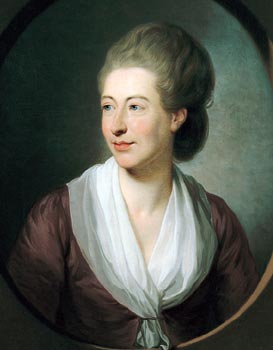The directory «Plots»
Charrière Isabelle de (born Isabelle-Agnès-Elisabeth van Tuyll van Serookskerken van Zuylen)
(1740— 1805)

Dutch-born Swiss novelist, essayist, dramatist, short story writer, librettist, and poet. Charrière was born into Dutch nobility and raised in aristocratic fashion at the family castle outside Utrecht. The first of seven children, she was educated both at home and abroad, studying in both Geneva and Paris under the tutelage of her Swiss governess, Jeanne-Louise Prevost, learning several languages and studying the writings and philosophies of numerous thinkers, developing a fierce independence of mind and spirit. In 1760 she met and began a relationship with a married Swiss colonel serving in the Netherlands, Baron Constant d'Hermenches. Although the two rarely saw each other, their affair lasted nearly fifteen years. The same year Charrière met the baron she also wrote her first novel, Le Noble (The Nobleman), a scathing satire of the aristocracy. When it was published in 1763, the novel caused immediate scandal, and Charrière's parents withdrew it from publication almost as soon as it appeared. Realizing the futility of attempting to publish her work on a wide scale, Charrière turned her literary talent to letter-writing and small self-circulated publications. In the meantime, she was courted by Scottish author James Boswell, to whom she responded curtly in a letter dated 17 January 1768: "I have sufficient mental ability to manage without a husband and without a household; I do not need, as they say, to be looked after." In 1771 Charrière did marry Charles-Emmanuel de Charrière, her brothers' governor, and a man who promised her the wide range of freedom within marriage she demanded. They moved to his manor in Switzerland, Isabelle bringing her two unmarried sisters to live with her. By 1783 she resumed writing and began traveling around Switzerland as well as to Paris and London, where she was presented at the royal court and was the guest of philosopher David Hume. The publication of her novel Lettres neuchâteloises in 1784 marked the beginning of an immense literary outpouring which characterized the later part of her life. In 1787 Charrière began a relationship with nineteen-year-old Benjamin Constant, nephew of Baron d'Hermenches and son of author Samuel Constant, to whose Le mari sentimental she had responded directly in her own Lettres de Mistriss Henley (Mistriss Henley, 1784). Despite a later break, the two remained in close correspondence until Charrière's death in 1805.
Charrière is best known for her epistolary novels of the 1780s. Lettres neuchâteloises weaves a chance encounter, an accidental pregnancy, and the interaction of a poor seamstress, a merchant's son, and the daughter of a noble French family into a commentary on the social costs of privilege. Mistress Henley takes the stifling marriage relationship described by Constant and interprets it from the woman's point of view. The principal action takes place as a pregnant Mrs. Henley faces admonishment by her husband for her independent actions, and the silencing of her voice in the matter of the child's upbringing. Notably, it is in this work that Charrière first used an intentionally ambiguous ending, with Mrs. Henley saying, "In a year, in two years, you will learn, I hope, that I am reasonable and happy, or that I am no more." In Lettres écrites de Lausanne (Letters from Lausanne, 1785), a widow writes of the pleasures and difficulties of raising a daughter on her own and seeking a suitable marriage for the girl that would allow her the freedom she so values. Importantly, the daughter recognizes this difficulty as well, and, in the end, matrimony and society living are rejected. And in what was to become her most popular work, Caliste, ou suite des Lettres écrites de Lausanne (Caliste, 1787), Charrière describes a relationship ruined by humility, complacency, and cowardice. While the work, which was published in her final years, is not as well known, it is notable for its variety and depth. During 1787 and 1788, Charrière published Observations et conjectures politiques, a series of political writings considering the respective causes of the French royalists and revolutionaries. She also examined the themes of the Revolution in a play, L'émigré, and another epistolary novel, Lettres trouvées dans des portefeuilles d'émigré (both 1793). Additionally, Charrière produced a study on Immanuel Kant's notion of duty in her 1796 novel, Trois femmes, and explored philosophies of education in works such as Les Ruines d'Yedburg (1799) and Sir Walter Finch et son fils William (published posthumously in 1806). Independent of her published work, Charrière was a prodigious letter-writer; collected, her correspondence comprises most of her ten-volume Oeuvre complètes (1979-84).
Widely published and translated, even in her own time, Charrière's work has received a great deal of critical attention. Early studies included two extensive efforts by noted nineteenth-century critic C. A. Sainte-Beuve. Her first biographer, Philippe Godet, in his Madame de Charrière et ses amis (1906), attributed much of her writing to biographical experience rather than literary skill; and this perception was seconded in the first English-language biography of Charrière, Geoffrey Scott's The Portrait of Zélide (1926), a study based largely on Godet's account. More recent biographies, however, have recognized her importance as both a literary figure and as an early advocate of gender equality. Critic Joan Hinde Stewart calls her work "powerfully seductive" in both form and Stewart describes her writing as "a delicate weave of inconspicuous circumstances and almost infinitesimal occurrences." This same characteristic critics such as Susan Lanser contrast with the larger, more general issues that figure prominently in the work of her contemporaries. While some critics praise the originality of her characters and themes, others, such as Jenene Allison, claim otherwise: "Relative to conventional figures, Charrière's heroines seem at first glance quite innovative. Considered more closely, they are better described as refutations of the conventional." Despite continuing debate over her literary reputation, critics generally commend Charrière's boldness and recognize her importance to the feminist literary tradition.
Netherlands, 1978, Passage from letter of Isabelle de Charrière